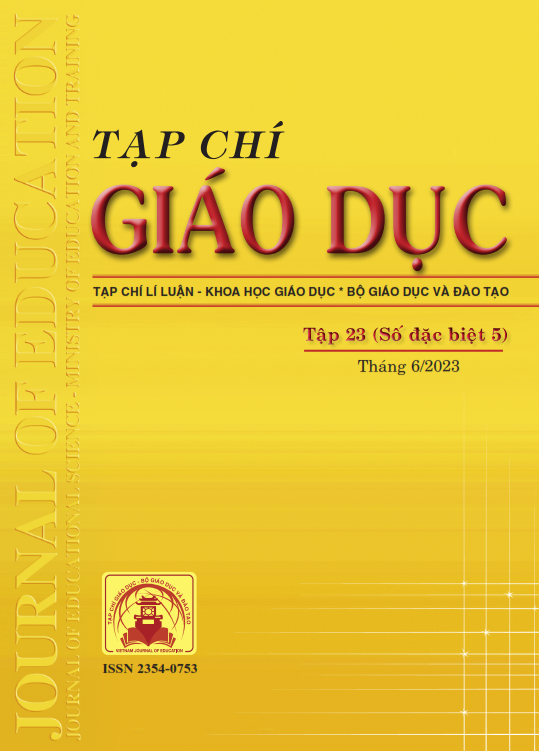Phân tích trắc lượng các nghiên cứu trường hợp về học tập suốt đời từ cơ sở dữ liệu Scopus giai đoạn 2012-2022
Tóm tắt
Education is not only an objective but also considered a key tool/means, the key to achieve the goals of sustainable development. Lifelong learning is increasingly being mobilized to address the global environmental crisis and the challenges that come with sustainability. The bibliographic analysis of 932 publications from the Scopus database was performed to evaluate the bibliographic content of the scientific output of case studies for lifelong learning for the period 2012-2022. The results show that the annual growth rate of studies in this direction is 2.95%. Four main research directions include: (1) Harnessing ICT to support lifelong learning in higher education; (2) Continuing education to meet the needs of the job; (3) Research on typical cases in which investment in high-level education, quality teacher training, along with vocational education and training, literacy, etc. to increase employability; (4) Promote social justice and general education by combining different learning methods, testing and assessment methods. The research results help scholars interested in this direction of research have a comprehensive overview of the reality of implementing lifelong learning in the world and provide useful quantitative information for scholars who want to do research in this direction in the future.
Tài liệu tham khảo
Baskarada, S. (2014). Qualitative case study guidelines. The Qualitative Report, 19(40), 1-25.
Baxter, P., Jack, S., & others. (2008). Qualitative case study methodology: Study design and implementation for novice researchers. The Qualitative Report, 13(4), 544-559.
Brown, J. D., & Rodgers, T. S. (2002). Doing second language research: An introduction to the theory and practice of second language research for graduate/master’s students in TESOL and applied linguistics, and others. Oxford University Press.
Chiu, W. T., & Ho, Y. S. (2007). Bibliometric analysis of tsunami research. Scientometrics, 73(1), 3-17. https://doi.org/10.1007/s11192-005-1523-1
Cohan, A., Ammar, W., van Zuylen, M., & Cady, F. (2019). Structural scaffolds for citation intent classification in scientific publications. NAACL HLT 2019 - 2019 Conference of the North American Chapter of the Association for Computational Linguistics: Human Language Technologies - Proceedings of the Conference, 1, 3586-3596. https://doi.org/10.18653/v1/n19-1361
Crowther, J., & Sutherland, P. (2008). Lifelong learning: Concepts and contexts. Routledge.
Do, T.-T., Thi Tinh, P., Tran-Thi, H.-G., Bui, D. M., Pham, T. O., Nguyen-Le, V.-A., & Nguyen, T.-T. (2021). Research on lifelong learning in Southeast Asia: A bibliometrics review between 1972 and 2019. Cogent Education, 8(1). https://doi.org/10.1080/2331186X.2021.1994361
Gür Erdoğan, D. (2020). Research Trends in Studies on Lifelong Learning: A Bibliometric Analysis with Visual Mapping Technique (2016-2020). Sakarya University Journal of Education, 643-666. https://doi.org/10.19126/ suje.819383
Phạm Xuân Hậu, Phạm Thị Thu Thủy (2012). Giáo dục “Vì sự phát triển bền vững” - Nội dung quan trọng trong triết lí giáo dục Việt Nam thời kì hội nhập. Tạp chí Khoa học Đại học Sư phạm Thành phố Hồ Chí Minh, 39, 43-49.
Hean, S., Craddock, D., & Hammick, M. (2012). Theoretical insights into interprofessional education: AMEE Guide No. 62. Medical Teacher, 34(2), e78–e101. https://doi.org/10.3109/0142159X.2012.650740
Kaarbo, J., & Beasley, R. K. (1999). A practical guide to the comparative case study method in political psychology. Political Psychology, 20(2), 369-391.
Laurillard, D. (2016). The educational problem that MOOCs could solve: Professional development for teachers of disadvantaged students. Research in Learning Technology, 24. https://doi.org/10.3402/rlt.v24.29369
Motola, I., Devine, L. A., Chung, H. S., Sullivan, J. E., & Issenberg, S. B. (2013). Simulation in healthcare education: A best evidence practical guide. AMEE Guide No. 82. Medical Teacher, 35(10), e1511-e1530. https://doi.org/10.3109/0142159X.2013.818632
Shapiro, H. B., Lee, C. H., Wyman Roth, N. E., Li, K., Çetinkaya-Rundel, M., & Canelas, D. A. (2017). Understanding the massive open online course (MOOC) student experience: An examination of attitudes, motivations, and barriers. Computers and Education, 110, 35-50. https://doi.org/10.1016/j.compedu.2017. 03.003
Wals, A. E. J., & Benavot, A. (2017). Can we meet the sustainability challenges? The role of education and lifelong learning. European Journal of Education, 52(4), 404-413. https://doi.org/10.1111/ejed.12250
Yazan, B. (2015). Three approaches to case study methods in education: Yin, Merriam, and Stake. The Qualitative Report, 20(2), 134-152.
Zou, X., Yue, W. L., & Vu, H. Le. (2018). Visualization and analysis of mapping knowledge domain of road safety studies. Accident Analysis and Prevention, 118, 131-145. https://doi.org/10.1016/j.aap.2018.06.010
Zupic, I., & Čater, T. (2015). Bibliometric Methods in Management and Organization. Organizational Research Methods, 18(3), 429-472. https://doi.org/10.1177/1094428114562629
Đã Xuất bản
Cách trích dẫn
Số
Chuyên mục
Giấy phép

Tác phẩm này được cấp phép theo Ghi nhận tác giả của Creative Commons Giấy phép quốc tế 4.0 .












